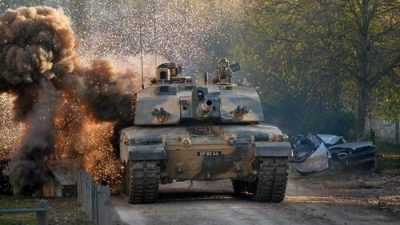Depleted Uranium: Courts Accept Cancer Risk Denied by Army
Courts across Europe have ruled that depleted uranium can cause cancer among troops. Yet the British army insists it is safe to supply Ukraine with the toxic tank shells.

All Global Research articles can be read in 51 languages by activating the Translate Website button below the author’s name.
To receive Global Research’s Daily Newsletter (selected articles), click here.
Click the share button above to email/forward this article to your friends and colleagues. Follow us on Instagram and Twitter and subscribe to our Telegram Channel. Feel free to repost and share widely Global Research articles.
***
More than 300 Italian veterans who developed cancer after being exposed to depleted uranium ammunition have won court cases against Italy’s military. Some of the cases were brought by their bereaved relatives.
The judgments have mounted in recent years, with Italian courts repeatedly finding a link between cancer and service in the Balkans where such weapons were fired.
Although Italy does not have depleted uranium weapons in its own arsenal, Italian police and soldiers were deployed to Bosnia and Kosovo where NATO allies fired the controversial ammunition in the 1990s.
Depleted uranium (DU) is a chemically toxic and radioactive heavy metal produced as waste from nuclear power plants. Britain uses it to make armour-piercing tank shells, which are now being supplied to Ukraine.
Scientific debate continues about DU’s long-term risks to human health and the environment in post-conflict zones. British ministers insist it is low risk, and that there is only “some potential heavy metal contamination localised around the impact zone.”
But in the Balkans and Iraq, many believe it has caused cancer. That view was shared in 2009 by a coroner in England, who held an inquest into the death of Stuart Dyson, a British army veteran.
Dyson cleaned tanks during the Gulf war in 1991 and later developed a rare cancer, passing away in 2008. An inquest jury found it was “more likely than not” that depleted uranium had caused his death.
The Ministry of Defence rejected the ruling and refused to pay his widow a pension for those who die from service. By contrast, the widow of Captain Henri Friconneau, a French gendarme who served in Kosovo, was granted a service pension when he later died from cancer.
An appeal court in Rennes ruled in 2019 that Friconneau’s death was due to his exposure to DU dust. France’s interior ministry accepted the judgment and added his name to a monument for those who died on operations in Kosovo.
When in Rome
But it is in Italy where the highest number of veterans have won compensation. One family received a 1.3m euros pay out in 2015 after the court of appeal in Rome found “with unequivocal certainty” a link between exposure to depleted uranium dust and cancer.
The Il Fatto newspaper said the judgement went further than previous rulings, as it recognised a causal link beyond just the balance of probabilities.
A more recent ruling in 2018 seen by Declassified found the court could not “rule out the possibility that a soldier who served” in the Balkans “would have been exposed to genotoxic pollutants, thus increasing the likelihood of illness.”
An Italian Parliamentary commission into the issue found “shocking” levels of exposure among Italian veterans and said it had “helped sow deaths and illnesses”.
Last month, Euronews reported that 400 Italian soldiers who were exposed to DU in the Balkans had since died from cancer, and another 8,000 were suffering from the disease. They interviewed the lawyer at the centre of the litigation, Angelo Tartaglia, who urged Britain to “think about the risks and the consequences” of supplying Ukraine with DU shells.
Tartaglia said: “There’s the possibility that both Ukrainian and Russian military officials might fall ill but most importantly pollution caused by military activities could cause irreversible damage to the environment which means that civilians too would be at risk”.
‘Panic in Italy’
Depleted uranium has been a controversial topic in Italy ever since soldiers returned from Kosovo. It was discussed in 2001 by Tony Blair’s cabinet, which felt “the panic in Italy…[was] premature since there had been no time for cancers to have developed.”
Although Blair wanted to “appear sympathetic”, he was also anxious not to jeopardise the UK-US special relationship as George W. Bush entered the White House.
Blair’s cabinet decided:
“The government should handle this in a low key manner and avoid the impression that it was distancing itself from the United States of America – which was the country that had used depleted uranium in Kosovo – just at the moment when a new US administration was coming to power.”
The invasion of Iraq in 2003 saw British and US forces firing the ammunition, triggering widespread concern. Britain’s Ministry of Defence recognised a ‘moral obligation’ to help Iraq clean up the shells after the war and published the firing locations.
The same approach is not being followed in Ukraine, where Britain has supplied thousands of tank shells, including some made from DU.
Armed forces minister James Heappey has told parliament:
“British-supplied Challenger 2 tanks and depleted uranium ammunition granted to Ukraine are now under the control of the Armed Forces of Ukraine (AFU). The Ministry of Defence does not monitor the locations from where DU rounds are fired by the AFU in Ukraine.”
He added:
“There is no obligation on the UK to help clear up depleted uranium rounds fired from Challenger 2 tanks by the Armed Forces of Ukraine.”
*
Note to readers: Please click the share button above. Follow us on Instagram and Twitter and subscribe to our Telegram Channel. Feel free to repost and share widely Global Research articles.
Phil Miller is Declassified UK’s chief reporter. He is the author of Keenie Meenie: The British Mercenaries Who Got Away With War Crimes. Follow him on Twitter at @pmillerinfo
Featured image: Challenger 2 battle tank

